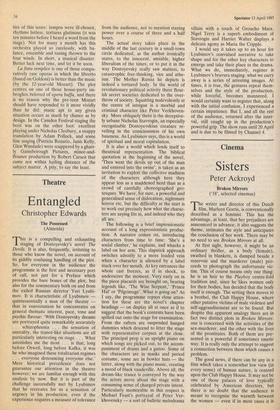Theatre
Entangled
Christopher Edwards
The Possessed (Almeida)
rrhis is a compelling and exhausting
staging of Dostoyevsky's novel The Devils. It is also, frequently, irritating to those who know the novel, on account of its giddily confusing handling of the plot. So, for everyone in the audience the programme is the first and necessary port of call, not just for a Preface which provides the bare bones, of the plot, but also for the commentary both on and from the exiled Russian director Yuri Lyubi- mov. It is characteristic of Lyubimov — quintessentially a man of the theatre — that in conversation he concentrates on general thematic interest, pace, tone and psychic flavour: 'With Dostoyevsky dreams are portrayed quite remarkably accurately
. . . schizophrenia . the sensation of unreality, the trance-like situations are all particularly interesting on stage . . . What astonishes me the most . . . is that, long before Orwell, long before Kafka, it was he who imagined these totalitarian regimes . . . everyone denouncing everyone else.' Mere historical precedence does not guarantee our attention in the theatre however; we are familiar enough with this analysis by now. But it is part of the challenge successfully met by Lyubimov that he recreates for us a sensation of urgency in his production, even if the experience requires a measure of tolerance from the audience, not to mention staying power over a course of three and a half hours.
The actual story takes place in the middle of the last century in a small-town circle dedicated, as the author ironically states, to the innocent, amiable, higher liberalism of the times; or to put it in the way Dostoyevsky really saw matters, to catastrophic free-thinking, vice and athe- ism. The Mother Russia he depicts is indeed a tortured body. In the world of revolutionary political activity there flour- ish secret societies dedicated to the over- throw of society. Squatting malevolently at the centre of intrigue is a morbid and criminal character like Peter Verkhoven- sky. More obliquely there is the deceptive- ly urbane Nicholas Stavrogin, an especially recognisable Dostoyevskian creature re- velling in the consciousness of his own baseness. As Lyubimov says, this is a world of spiritual and moral capitulation.
It is also a world which lends itself to theatrical representation. The biblical quotation at the beginning of the novel, 'Then went the devils up out of the man and entered into the swine', is taken as an invitation to exploit the collective madness of the characters although here they appear less as a maddened herd than as a crowd of carefully choreographed gro- tesques. We have, for sure, a powerful and generalised sense of dislocation, nightmare horror etc, but the difficulty at the start is to work out precisely how what the charac- ters are saying fits in, and indeed who they all are.
The following is a brief impressionistic account of a long expressionistic produc- tion. A narrator comes on, introducing characters from time to time: 'She's a social climber,' he explains, and whacks a label on her arm. This slapstick approach switches adroitly to a more loaded vein when a character is silenced by a label stuck over her mouth. At key entrances the whole cast freezes, as if in shock, to underscore the moment. Very early on in the piece placards are brought on, bearing legends like, The Wise Serpent,' Prince Hal' or 'Pilgrimage'. What is going on? As I say, the programme repays close atten- tion for these are the novel's chapter headings — on display all at once as if to suggest that the book's contents have been, spilled out onto the stage for examination. From the rafters are suspended hanged dummies which descend to litter the stage with representative corpses at the close. The principal prop is an upright piano on which songs are picked out, to the accom- paniment of drums and a gazoo. Some of the characters are in masks and period costume, some are in bowler hats — the latter, along with the piano music, creating a mood of black vaudeville. Above all, the dream-like trance is conveyed by the way the actors move about the stage with a consuming sense of charged private intent. Particularly memorable in this respect is Michael Feast's portrayal of Peter Ver- khovensky — a sort of balletic melodrama
villain with a touch of Groucho Marx. Nigel Terry is a superb embodiment of Stavrogin and Harriet Walter displays a delicate agony as Maria the Cripple.
I would say it takes up to an hour for Lyubimov's convulsed narrative to take shape and for the other key characters to emerge and take their place in the drama. What we do, immediately, register is Lyubimov's bravura staging: what we carry away is a series of arresting images. At times, it is true, the gestures repeat them- selves and the style of the production, while forceful, becomes mannered. I would certainly want to register that, along with the initial confusion, I experienced a certain impatience. But I, and all the rest of the audience, returned after the inter- val, still caught up in the production's powerful grip. The show runs until 20 April and is due to be filmed by Channel 4.














































 Previous page
Previous page